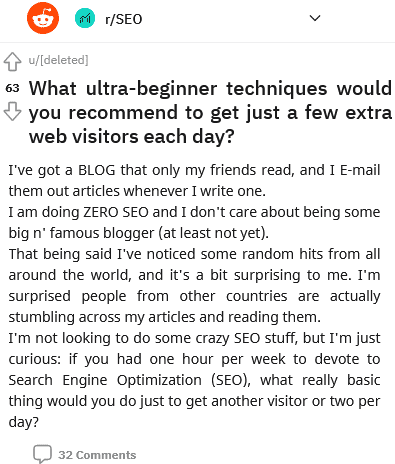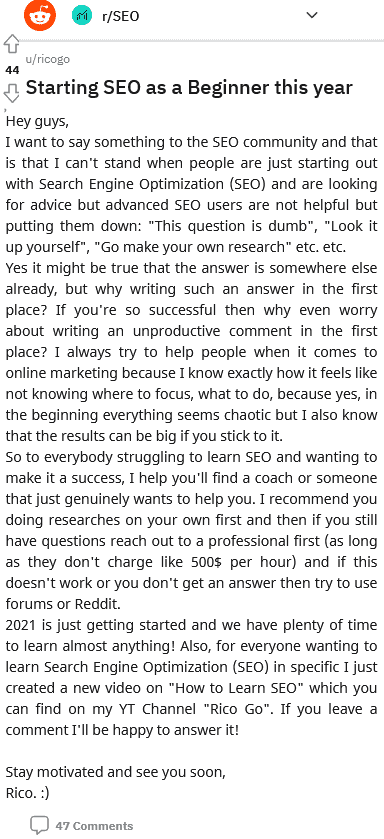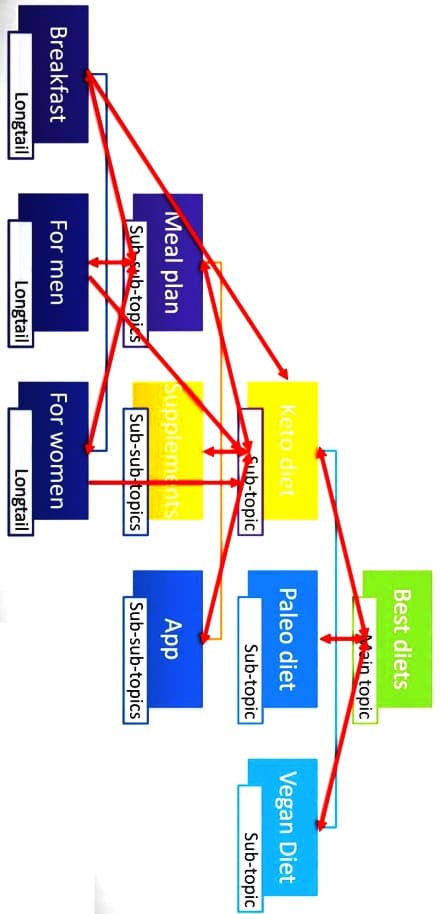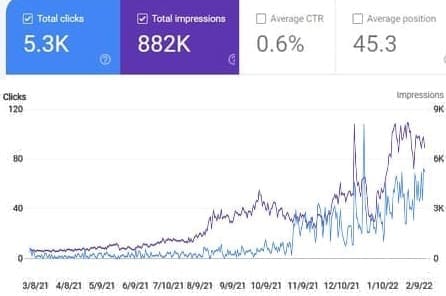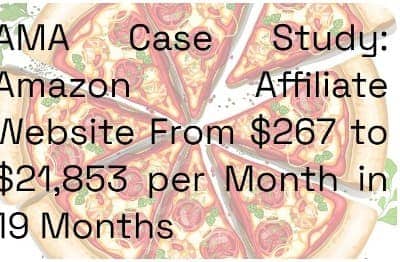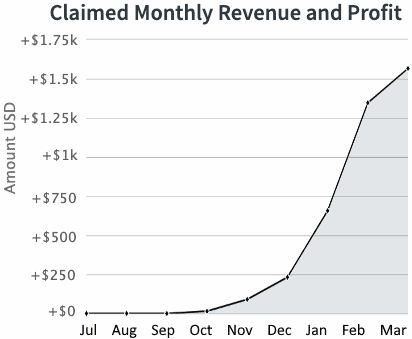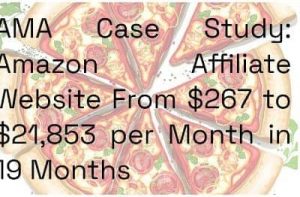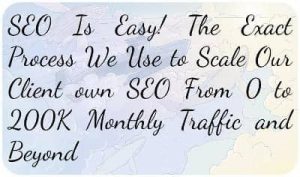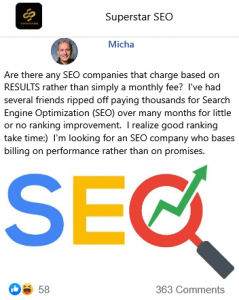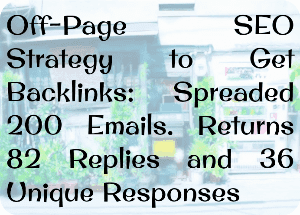u/ChaseReiner
I Created A List Of 31 Things I Wish I Would Have Known About SEO When I Started Out
Hey, r/SEO I know some of you have been getting value from my lists so I created a post of 31 things I've learned about Search Engine Optimization (SEO) that I wish I would have known when I started.
Note: to those of you who have been hating on me for suggesting some of the tools I've created, I'm not trying to push my products, I've created these tools to make SEO easier for me and thus I offer them to others as well.
With that being stated, let's get something clear, SEO is marketing. It's not some magical unicorn that gets you or your clients to page one on Google for any keyword by sprinkling mystical fairy dust onto a website.
Search Engine Optimization (SEO) should be expected to work like any other type of marketing, NOT GUARANTEED.
At the end of the day, you and your clients should be concerned about one thing: Return on investment.
Furthermore, Organic traffic alone is a major liability. You need to figure out other ways to market your brand on separate platforms besides just Google.
Let's dive in.
• Understand the basics.
SEO isn't what it used to be where you could just build links to a page and rank it.
These days you need to focus on creating content that people actually want (user intent optimization) and building authority in the niche you're going for. Consistency is key to building authority.
2. Learn The Different SEO Acronyms
to get caught up on the lingo, this is something I wish I would have learned right away when I first got into SEO. I created a post of all of the acronyms you'll want to know here: chasereiner(dot)com/blog/seo/google-acronyms/
3. Understand Basic On Page SEO
Here's a quick cheat sheet of important on-page factors you need to look at from greatest to least importance:
• Page Speed
• MC and SC
• Word Count
• Mobile UX
• Title tags
• Heading Tags
• Internal Linking
• Images With Alt Tags
• External Linking
• Video (depends on search)
• Meta Description
• Schema Markup
• OG Data
Now let's break down each of them into quick optimizations (this list is not extensively covered by any means)
4. Page Speed Optimization
The two best things you can do for page speed, is to compress your images with Tinypng(dot)com or use a WordPress plugin like Smusher and get good hosting like Siteground(dot)com Make sure to head over to GT Metrix and run a scan, if your page speed is still terrible to follow the suggestions listed there.
5. MC (Main Content) and SC (Supplementary Content)
This one is straight out of Googles Page Raters guidelines. (https://static.googleusercontent(dot)com/media/www.google(dot)com/en//insidesearch/howsearchworks/assets/searchqualityevaluatorguidelines.pdf)
Main content is the content that will not be included on multiple pages (is not for User Experience (UX)) This is the content Google weighs in the most into its algorithm.
Supplementary content is content such as "recent posts" or menu links which is used for UX purposes and is weighed in the least by Google.
6. Word Count (based on averages)
If the top pages ranking on Google have 1000 words and you only have 300, you might want to optimize for the average. I have a software called Bench Marketer that does these calculations for you if you don't feel like eyeballing the results.
7. Mobile User Experience (UX)
This is easy enough these days, if you're using a content management system, just make sure the theme you go with is mobile friendly.
8. Title Tag Optimization
Title tags are easy enough to optimize as long as you include your main keywords and some sort of qualifier to hook people in. For example: Search Engine Optimization (SEO) For Dummies (I Wish I Would Have Known This) Also, try to keep your titles under 75 characters and over 45 in length.
8. Heading Tag Optimization
The most important heading tag you need to always include is an H1. Your H1 should usually represent what is in your title tag otherwise your users may get confused with what they clicked into. Other heading tags should be structured so that people who want to skim through your copy can easily navigate to different sections. As far as different heading tags like h2's, h3's, etc. being more important, I would just try to match what others are doing on the front page.
9. Internal Linking
If you want to pass valuable page rank influence to the other pages on your site internal link 2-3 times per 500-1000 words. Remember not to over internal link, you will end up diluting all of your links the more links you put into your copy.
10. Images With Alt Tags
Images can really help keep people on your pages and lower your bounce rates / boost your dwell times. Just make sure that if some of your visitors are blind, they can see what your image is about by using a screen reader to read alt tags. Don't keyword stuff your alt tags, just say what the images are actually showing.
11. External Linking
External linking actually improves your relevancy, just make sure you're not pointing to some spam site. I recommend 1-3 external links per page or post (this also depends on intent, some pages require more).
12. Video Optimization (depends on search)
Video isn't always the best option but I have seen it improve rankings before and lower bounce rates. I've also seen it do vise versa, again it depends on the intent. There is something really cool my lead SEO at my agency figured out, how to load videos instantly without reducing page speed. If you want a tutorial for this, leave a comment and let me know.
13. Meta Description Optimization
Just make sure you are including your keywords, this will help you boost your Click Through Rate (CTR)'s from the bolding they will get in Search Engine Result Pages (SERPs). Your meta description should be about 155 characters long.
14. Schema Markup Optimization
Schema Markup is a language created by Google, Bing, and Yahoo which they can interpret on a page to understand what it is about. I will need to create another tutorial for this section but Schema Markup can boost your CTR's like crazy. If you want to begin an experiment with Schema you can do so by getting a free plugin such as the WordPress Jason-LD Schema plugin. (Here is a little bit outdated tutorial I made a year ago going over advanced Schema Markup (https://www.YouTube(dot)com/watch?v=Awejeglf3xQ)
15. OG Data Optimization
OG data is your social share data and is very important if you're going to be aggregating your content to other platforms (which you should). To manipulate this data you can use a WordPress plugin called WPSSO, I highly recommend it.
Now that you know a bit about on page basics let's get a little bit more technical.
16. User Experience Optimization
Google obviously wants its users to be happy, so it's very likely that if your website isn't providing a good User Experience (UX) for its users, you're not going to rank well.
Here are some things you need to pay attention to in greatest to least importance:
* Click Through Rates
* Bounce Rates
* Conversion Rates
Let's break down some of the ways you can optimize for each of these:
17. Click Through Rate Optimization
For Click Through Rate (CTR) optimization, try to find ads that are ranking on Google for similar keywords, because advertisers are spending a ton to get a good quality score and low cost per click's you can copy similar titles into your titles and meta descriptions. Alternatively, if your page has been ranking for about a month, go to Google Search Console, see what your page is getting the highest CTR's for and include those into your title. Also, as mentioned previously, make sure you include qualifiers.
18. Bounce Rate Optimization
To lower your bounce rates, The best thing you can do is:
A) Increase page speed.
B) Focus on creating a design that exactly represents what your target visitor is intending on finding.
C) Video and images may also help reduce bounce rates.
Utilize the free tools offered by Google
18. Conversion Rates
To boost conversion rates, make sure your page is clear with what you want your users to do. You may also put a call to action above the fold on your website which will probably help as well.
19. Utilize Free Tools
The top free tools are as follows:
• Google Search Console
• Google Analytics
• Google Keyword Planner
• Screaming Frog
• Google Sheets
• Yoast SEO plugin
There are plenty of other tools I could have listed here but these are the first I'd say you need to get right away.
Let's go over each of them.
20. Google Search Console
Google Search Console (GSC) gives you the ability to see if there are any problems going on with your website, submit URL's to get indexed, analyze incoming links, but most importantly, it's the only tool which is going to show you how many clicks and what CTR's you're getting for the keywords you're ranking for.
21. Google Analytics
Google Analytics (GA) is going to help you see what your UX is on your sites such as bounce rates, conversion rates, pages per session, traffic from different sources, unique user data, and a whole lot more.
22. Google Keyword Planner
GWP enables you to find keyword data for what people are searching on for on Google and what their search rates are.
23. Screaming Frog
Screaming Frog helps you quickly identify on page issues with your website (up to 500 URLs for free).
24. Google Sheets
GS is just amazing for tracking your data and auditing websites.
25. Yoast SEO Plugin
I honestly don't care what SEO plugin you use, Yoast is great because it doesn't only give you the ability to optimize your titles and meta but adds extra functionality such as utilizing canonical links and automatic redirects (if you get pro)
26. Utilize Paid Tools
If you have the budget, get the following tools by order:
• Ahrefs or SEMrush
• Screaming Frog Pro
• Chase Reiner SEO Audit Template
• Cognitive SEO Content Analyzer
• Bench Marketer or Cora
• Ahrefs or SEMrush
Ahrefs and SEMrush are great for a competitor and keyword analysis. If I could choose one over the other it would definitely be Ahrefs as their data seems to be a lot more accurate and I prefer their interface over the other.
28. Screaming Frog Pro
Screaming Frog Pro is important to get if you're going to start auditing / optimizing sites with over 500 URLs (which you probably will)
29. Chase Reiner SEO Audit Template
I'm only promoting one of my own products because I've spent countless hours creating an SEO template that tells you what you need to check for when auditing a website with something like screaming frog. https://chasereiner(dot)com/products/seo-audit-service/
30. Cognitive SEO Content Analyzer
Cognitive SEO Content Analyzer shows you what words you need to mention more of in your copy in real time. This is really nice when you're doing on-page SEO for a niche you might not know a ton about.
31. Bench Marketer or Cora
I initially created Bench Marketer because I only wanted to see word count, image count, etc. instead of the thousands of factors Cora shows you.
Here are the pros and cons of both:
Bench Marketer pros: (super fast crawl, a lot cheaper than Cora (only $49 a month opposed to $249 a month)
Bench Marketer cons: Still sort of in beta and occasionally crashes, doesn't have nearly scan nearly as many factors as Cora.
Cora pros: (Gives you an insane amount of data (including link data if you have AHREF's subscription)
Cora cons: (Super slow for crawls and having data such as (number of Pinterest shares) doesn't seem to be helpful. Cora is also pretty expensive and sort of confusing to setup / understand).
So there you have it, a quick list for beginners, I hope this was helpful to some of you.
Until I see you all next time, happy SEOing!
69 💬🗨
📰👈
Actual__Wizard
Cora
Every time I see somebody talking about this product, their back-link profile has 250k+ no-follow links spammed into it and they're ranking jack shit… I think that product was specifically designed for Tin Foil Hat SEO users. You have to kind of know that there's too much variance in the primary factors to ever be able to successfully correlation test the minor ones with out a data-set involving millions of rows of data.
From experience, Google does some pretty strange stuff past about page 3-4 on the lion's share of keywords so how does that even work?
Also, if you know how to do this, you can target an obscure keyword and instantly rank a blank page on a domain with zero links, so what does it do when it analyzes that Search Engine Result Page (SERP)? Does it just uninstall itself?
I think that product was specifically designed for Tin Foil Hat SEO users.
Awesome. Please keep spouting your ignorance on the software and showing your ineptitude. CORA is an analytics software and does nothing for link building/actual ranking. I would bet that you actually have never seen someone talking about Cora and one of the sites they referenced (i can only assume you meant, a site someone has used Cora to help recommend optimization tips) as having anywhere i the ballpark of 250k + no-follow. Oh, I know you weren't literal. But, even talking in vaguaries, you are full of shit.
> From experience, Google does some pretty strange stuff past about page 3-4 on the lion's share of keywords
And there you go showing your total ineptitude. No, Google doesn't "do some pretty strange stuff past…". Google is actually fairly predictable. When a site is optimized for known ranking factors Google is fairly predictable. When Google is forced to figure out how a site should rank when it and other sites aren't optimized well, Google is pretty consistent in how it tries to decipher and assess value.
" CORA is an analytics software and does nothing for link building/actual ranking. "
I'm fully aware of what it does.
" (i can only assume you meant, a site someone has used Cora to help recommend optimization tips) as having anywhere i the ballpark of 250k + no-follow. "
Yes that's what I am suggesting. Correlation tests will reveal all kinds of strange patterns that do not help your ranking, such as having many nofollow links.
" No, Google doesn't "do some pretty strange stuff past…". Google is actually fairly predictable. "
I guess we are going to have to agree to disagree there. I would suggest that it depends on the keyword. On low competition keywords, it definitely does stuff that is completely bizarre past about page 3. Just as one example: my newest site was showing up on keywords related to teddy bears in the 60-100 range and the word "teddy" and "bear" are not on the page, nor does the content have anything to do with stuffed animals. I admit there is a picture of a bear on that page, so Google must have picked on the word "bear" in the image filename. I would consider the behavior to be "pretty strange."
" When a site is optimized for known ranking factors Google is fairly predictable. "
I agree with you there but there's a number of things in the software that are not useful and you are better off turning those things off. I guess that's my biggest issue with it. 80%+ of the things it analyzes are not useful and you're just burning CPU cycles.
From personal experience, I just write a decent piece of content and make sure the keyword has prominence on the page. Then do outreach marketing to get "quality" links to the page or build internal links from pages that have external links pointed to them that are relevant, wait about 4-5 months. If the page isn't performing well, then I'll sit there and look at the on-page SEO and try to see what's going on and make adjustments if I feel it will be beneficial.
Every time I sit there and attempt to tweak the onpage factors before the page ranks somewhere, I end up jerking around for hours and the results don't seem be any better and I usually feel like the quality of the content suffers.
In situations where it does find real factors, I would highly doubt that factor is more significant than a single quality link, unless it is one of the known and well discussed factors.
I'm being serious here, how the hell do you optimize a page for 300+ supposed factors and have time to do anything else?
How can you justify that time being used when there's clearly pages that are exceptions to whatever correlations it finds all over the internet?
How can you even claim the data is any good when there's thousands of factors that the tool doesn't analyze?
Since things like link age and content age are real factors, how can you even sort this out "scientifically" as you suggested in your other response. How do you evaluate whether or not you are starring at patterns in chaos?
Sorry, I just feel your time is much better spent doing just about anything else that's well known to increase rankings or generate traffic.
This feels like an identical conversation I had with somebody talking about some of the Public Relations (PR) simulator tools that were available years ago… Sorry I don't understand how that helps… The person eventually admitted that it was mental masturbation after a few years of arguing about it.
SalvationLiesWithin
There is a correlation-causation mixup in how you are looking at cora usage and complexity of a website. It because of the complexity the tool is needed, not vice versa
" It because of the complexity the tool is needed "
I don't disagree with you there but I think a tool that is well respected by the industry like Ahrefs is a lot more helpful to the vast majority of people.
There have been many studies done that have been carried out to millions and billions of rows of data.
I do not see how do correlation testing on one Search Engine Result Page (SERP) is useful to anyone. There is not enough data there to be statistically meaningful when it is known that there are multiple variables.
It is true that you can correlation test a single variable with a small data set when the known outcomes are limited.
Suggesting that an algorithm that factors in an unknown number of variables, that is known to utilize what is likely a custom version of LSA, and also suggest that it can adapt to the multiple algorithmic penalty factors, with a data set size of 100 or less, is statistical malpractice.
Increase the data set size by a million or more and maybe, but I would still be skeptical unless I saw the math myself and had adequate time to research the methodology.
You do realize that to do a correlation test to a high degree of statistical confidence when there is an unknown number of deterministic variables that you need a sample size of infinity correct? You did pass statistics class I would hope? You do also understand that in the case of multiple deterministic variables, linear regression is likely to be much more useful than correlation testing correct?
Back to your original comment:
" It because of the complexity the tool is needed "
You're right, you need a data set as close as it possibly can be that is representative to the entire internet and a supercomputer to analyze it.
Please do some research into the size of Google's data-centers and learn about how incredibly complex an analysis like linear regression is.
I'm going to go out on a limb here and suggest that the real way to do what that software aims to do is not actually possible with any amount of money.
steffanlv
⮚ Search Engine Optimization (SEO) isn't what it used to be where you could just build links to a page and rank it.
Bullshit. It may be more difficult, requiring my finesse and work/money, backlinks still work. The "SEO isn't what it used to be" is the refuge of the inept.
3. *sigh* Did you really reference image alts? No. This was your chance to spout the value CORA offers and why on-page optimization tactics, in relation to those other sites ranking in the top 10 for the optimized keyword phrases. When will people stop talking about their "on-page optimization guides". You tailor on-page to your competitors, NOT a guide.
4. You seriously didn't mention page speed in the same breath as you did a WordPress plugin, did you? /s
5. 99.9% of every "SEO" that references the Google Guidelines doc has absolutely no clue what they are referring to or why the guidelines matters. Yes, that apparently means you too.
6. There you go…a perfect opportunity to reference optimization in relation to other sites that rank in top 10. Don't know why you didn't mention Cora though. However, unfortunately, you did fail to make mention of the recent trend (seemingly) of shorter, more focused (E-A-T) content outranking authority content that was much longer. Opportunity lost I guess.
7. Um, no…just no. Google IS mobile first today. SEO users should be recommending people move from Content Management System (cms) platforms, ensure that all content is the same regardless of resolution, browser, etc.
8. I ran out of patience.
I'm sure a lot of what you posted may be ok, idk. I just wish people on this sub that think they know SEO would finally take the clue, wake up and post feedback from their own tests, case studies, etc. You know, actual experience. Guides like your just don't help. Much of what you post is wrong, just wrong. It's not your fault. You grew up probably reading Neil Patel, Bruce Clay, Moz, Search Engine Journal (SEJ), etc. That's not how SEO works. We work as a community when we pull theories, test them and post results. This is a scientific community, not a "one guide to rule them all".
This sub could be so so helpful but as long as these "I created a list of…" threads keep popping up, it's going to be shit, just like Moz, countless other Facebook and many other forum groups.
📰👈
Strategy to Land new SEO Clients or improve Customer Acquisitions!
Share your ways on How to Get SEO Clients?
The Summary of Discussion 2: 19 Ultra Beginner Tips to Grow Website Traffic
u/[deleted]
What ultra-beginner techniques would you recommend to get just a few extra web visitors each day?
I've got a BLOG that only my friends read, and I E-mail them out articles whenever I write one.
I am doing ZERO SEO and I don't care about being some big n' famous blogger (at least not yet).
That being said I've noticed some random hits from all around the world, and it's a bit surprising to me. I'm surprised people from other countries are actually stumbling across my articles and reading them.
I'm not looking to do some crazy SEO stuff, but I'm just curious: if you had one hour per week to devote to Search Engine Optimization (SEO), what really basic thing would you do just to get another visitor or two per day?
32 💬🗨
📰👈
Hi!
Here are a few tips:
1 Pay attention to your title.
• Start the title tag with your keywords.
• Add modifiers to your title: For example, "guide" or "2018"
• Wrap it in an <h1> tag.
2 Use a lot of multimedia
Engaging videos, images, diagrams are all work great (reduce bounce rate and increase the time people spend on your site, also they will more likely to link to it)
3 Drop your keyword in the first 100 words.
You don't have to go super technical with Search Engine Optimization (SEO) if you don't want. A simple technique like this will help search engines to better understand the topic of your page.
4 Make your site responsive.
Google recently accounted their mobile first index, which basically means you are indexed according to the mobile version of your site.
5 Use outbound links.
It's a relevancy signal that tells Google more about the topic of your website and also boost your authority.
6 Use internal links.
You don't have to go crazy about them. 2-3 link to your relevant post will do the job. Check out how good Wikipedia is in it.
7 Boost the speed of your site.
Page speed is a ranking signal. Also, people don't like to wait a lot. You can compress your images or use advanced hosting plans to speed up your site.
8 Write long articles.
Long in-depth articles tend to outrank short low-quality blog posts.
9 Use Latent Semantic Indexing (LSI) keywords.
LSI keywords are synonyms Google uses to determine the relevancy of your site. You can Google your keyword and check out the related searches Google shows at the bottom of the result page. Sprinkle some of these into your posts.
Excellent tips.
jgeo888
Hey, regarding number 3 – do you mean don't write any keywords in the first 100 words? Yoast tells me use them in my first sentence so I'd be interested to hear more.
Great list by the way!
No, you SHOULD include your target keyword in the first 100-150 words.
The theory is simple:
The higher your keyword appears, the more important it is as it relates to the content of your page.
Thanks for your question! Have a nice day.
icekoh
Does this include the page title or only the meta description?
marcellpetras
It includes your page title and your actual content section.
Meta description tags are not tied to search engine rankings but are extremely important in gaining user clicks from Search Engine Result Pages (SERPs).
Think about them as your opportunity to advertise your content.
Searchers will use it to decide how relevant your page is and whether it's worth to click on it or not.
It makes sense to include your target keyword there, but concentrate on creating a compelling description.
TheShynola
Great list! There's a debate about Latent Semantic Indexing (LSI) keywords or not, if I can recall. Never seen it work for my projects anyway.
LemmeTakeAperture
One that wasn't mentioned is if your friends enjoy the articles you write and encourage you to keep doing them, ask them if they can just share it with one friend they think would find the articles interesting as well. Odds are if they like it, they would be willing to share it with just one person.
This will also take your site one step removed from you and into the eyes of people who may also like it. It's not a ton of visitors, but it's more.
JoeAdamG
I would check Search Console to see which pages/keywords are driving organic traffic and double down on them. If I'm getting "blue poodle groomers" traffic to my "poodle groomers" page without any explanation, I'm going to at least add a section on blue ones. Throw in a photo, consider updating the title and meta description, and get at least one internal link to that page with the right anchor text.
thelinksguy
I actually think once you have your on-page SEO done (you could nail it within 2-4 weeks), but there's only so far you can take on page SEO. Matt Diggity has a great guide Matt Diggity
Beyond that you need link building (off page SEO) which is fairly time consuming.
you could instead use that extra hour of the day, creating content and sharing it on social media. This is based somewhat off Gary Vee's content strategy.
• create a bunch of social media accounts (YouTube, FB, insta and maybe Snapchat) and then repurpose that article, or a part of that article for each platform. I.e. a photo/quote or short video for insta, same for snapchat. For Facebook share a link to the article along with an image, and maybe a longer video for YouTube.
• each day, engage with people on social media, add them, comment on their stuff and promote it with hashtags.
• continue to update each week, repurpose your next piece of content and then follow the cycle.
You'll start to find that when you start dropping your link in posts, and display it in your social profiles, that trickles of traffic will start to come in. Better yet, it creates a kind of "buzz" around your name or blog brand. Once you've felt you've got enough time, you could then look at link building, connecting up with influencers in your field, etc.
josephwesley
Here's what I've done to get 75k visits per mo on a blog from Search Engine Optimization (SEO).
• Write long tail SEO articles. Basically, come up with a topic then do a Google search to see what people are searching around that topic.
• Write your headline do it exactly matches what people are searching for.
• Write the article and include the keyword phrase in the article multiple times + in a sub headline.
• Write a custom meta description that includes the keyword phrase.
• Write your URL to match the keyword phrase.
• Make sure your article is really good and really in depth.
• Keep writing, don't stop, and the traffic will come.
📰👈
Advice for SEO Beginners to get First Client
A Freelancer Ended Up Wanting to be a part of a Company Team
AMA Case Study: Amazon Affiliate Website From $267 to $21,853 per Month in 19 Months
The Summary of Discussion 1: 19 Ultra Beginner Tips to Grow Website Traffic
u/ricogo
Starting SEO as a Beginner this year
Hey guys,
I want to say something to the SEO community and that is that I can't stand when people are just starting out with Search Engine Optimization (SEO) and are looking for advice but advanced SEO users are not helpful but putting them down: "This question is dumb", "Look it up yourself", "Go make your own research" etc. etc.
Yes it might be true that the answer is somewhere else already, but why writing such an answer in the first place? If you're so successful then why even worry about writing an unproductive comment in the first place? I always try to help people when it comes to online marketing because I know exactly how it feels like not knowing where to focus, what to do, because yes, in the beginning everything seems chaotic but I also know that the results can be big if you stick to it.
So to everybody struggling to learn SEO and wanting to make it a success, I help you'll find a coach or someone that just genuinely wants to help you. I recommend you doing researches on your own first and then if you still have questions reach out to a professional first (as long as they don't charge like 500$ per hour) and if this doesn't work or you don't get an answer then try to use forums or Reddit.
2021 is just getting started and we have plenty of time to learn almost anything! Also, for everyone wanting to learn Search Engine Optimization (SEO) in specific I just created a new video on "How to Learn SEO" which you can find on my YT Channel "Rico Go". If you leave a comment I'll be happy to answer it!
Stay motivated and see you soon,
Rico. :)
47 💬🗨
📰👈
Honestly, I think it's because a lot of those posts/questions come from a point of laziness. "How do I do Search Engine Optimization (SEO)?" "Teach me to do SEO." Those are clearly people who haven't even tried.
If someone comes through and says, " Hey I read this about H1s and H2s but I don't understand this certain aspect. Could someone clarify?" THAT is a post that is going to get some responses.
If you spoon feed things to people who are lazy, they will always be lazy.
I totally get your point here. Still, isn't it hard for beginners to understand anything? It's like sitting in school where you start learning about a completely new subject. No one knows anything about it yet, isn't it helpful then to raise the hand if they have questions in their minds already and ask them?
Everybody is individual and what is easy for one person is hard for the other so if one person doesn't know the difference between H1 or H2 isn't that the same as asking "What is SEO?" Just from a further perspective. The person talking about h1 and h2's has spent more time with SEO than the other one, that's a fact but someone then asking how to add a Trigger on their Google Tag Manager (GTM) installation for their Analytics will think the same about the h1 guy as the h1 guy about the What is SEO person?
Hope this makes sense.
It definitely makes sense, and I appreciate you sharing your view point.
I think the difference is that in a school setting, that's someone who is being paid to teach you. It's literally their job to teach you.
Here, you have people who are not getting paid to help. They are doing it out of good will. And while I think that's awesome, I think it's unhealthy to the learning experience when experts become too readily available.
If you just give someone all the answers, do they really learn? I'd rather guide people in the right direction, so they can learn on their own and truly master the topics.
If you're willing to help people that have demonstrated zero effort to learning, that's awesome. However, for me, my time is more important. I'll help someone who shows they are willing to at least try falling on their face once or twice. I won't help people who just want the answers to the test.
Neither of us are wrong; but choosing to ignore the lazy questions is my personal preference.
ricogo ✍️
Appreciate your further answer. Makes sense and I think we have the same point of view with different wordings. Have a good time! :)
thailandTHC
This is an excellent point.
I come from a different era. When I was growing up there was no Reddit or even Google.
I guess the internet technically existed but only on university campuses.
Back then, if you wanted someone to help you or show you something, generally, you had to provide value to them.
LOL. Reminds me of the original Karate Kid when he's made to do menial tasks like washing the teacher's car.
Fortunately, nobody ever made me do anything like that, haha, but the lesson there was that someone sharing their knowledge with you is something you should appreciate. It was beyond rude to waste their time.
Back in the early days of the more consumer-level internet, Usenet, early www, etc, it was an amazing honor to have someone knowledgeable share their thoughts.
Like the author of a programming book who would answer questions in a Usenet group or set up a website to expand on topics in his book.
You wouldn't waste their time with trivial crap. That's why Frequently Asked Questions were created. It was to give the newbies a place to start. Anybody that dared ask a question that was already covered in the Frequently Asked Questions (FAQ) was flamed by the entire community for violating this protocol.
I don't mean to make it sound like you had to be a servant to anyone, but every Reddit sub seems to have this same problem of people who make little or no effort to educate themselves, expecting others to simply freely volunteer to help them.
The internet works when everyone contributes. There are only so many experts or people with knowledge and an almost infinite number of people needing help.
When demand for help is so disproportionate to the number of people with knowledge, the tendency is to ration scarce resources and to put the information behind paid barriers.
So, in a way, telling people to help themselves is a way of keeping the knowledge free.
meghanmck
This is it for me. I also hate that question because there are so many possible answers. It's literally like someone saying, 'how do I advertise?' Well, I could give you a thousand replies. However, get specific and I can as well! In response to your reason, I think it's like I want them to show me you tried even a tiny bit. Pick one thing you're stuck on or having trouble with and ask. Third, it's hard to answer a question if the person can't speak the basic vocabulary. If I want to learn smithing I need to look up the words of supplies and names of tools.
You nailed it with the thousand answers. WAY easier to answer a specific question than a broad one.
meghanmck
My favorite, 'how much does a website cost?' That's like saying, 'how much does a vehicle cost?'
SandHK
While I agree I also think there are other aspects. I've had a couple of websites for a few years and have just starting to think about/look at Search Engine Optimization (SEO). Knowing where to start has been an issue and finding good basic information has been a problem for me. There are many many Getting started with SEO posts online but very few have any substance to them.
It is sometimes hard to search for something when you don't really know what you need or what to look for. How about adding links to good resources in the sidebar so beginners have somewhere to start. Even a glossary would help.
Odd-Apartment-7420
This is a valid point
hamchan_
It's an entire profession. Specific questions will get better responses over "how do I Search Engine Optimization (SEO)?"
Beyond that I joined this board hoping to see experts discussing techniques or updates. Instead it's mostly people who don't understand that SEO is an abbreviation.
It's just a bit exhausting. I'll admit I would rather just down vote and ignore those posts rather than argue with them.
📰👈
kickit
If someone's question is legitimately "how do I learn basic SEO" there are tons of great resources that can be found with a simple Google search. Moz's beginner's guide and Ahrefs ' how to learn SEO articles are both very detailed, well-linked starter guides that will do much better than just asking around on Reddit.
I'll happily drop some comments if people are coming in here with legitimate questions. But even then, it seems a third of the time the OP will talk back, try to argue, and doesn't really want to learn.
In terms of finding a mentor, what you're really looking for is an entry level job in SEO or digital marketing. That's almost always going to be the best way to learn. If you're ready to apply yourself, you'd be surprised how easy it is to get a beginner SEO job in a city like New York City (NYC), even without experience. (I can't speak for other job markets)
TakeAChanceToday
Hey OP,
All I can say is jeez louise.
We had a post like this literally two three weeks ago. This sub is such a garbage can because of the mods but crybaby posts like this sure don't help.
No one is obligated or paid to help you here.
Just look at the responses OP. You're in the minority.
99% of these posts can be answered by 10 seconds of research. Generally in this subreddit you won't see someone say that's a dumb question but you sure as shit will see lazy and entitled f*ckers called out.
You can see the absolute hypocrisy and idiocy of this post by your own words. You say:
"not helpful but putting them down: "This question is dumb", "Look it up yourself"
and then literally a few sentences later…
"I recommend you doing researches on your own first and then if you still have questions reach out to a professional first (as long as they don't charge like 500$ per hour) and if this doesn't work or you don't get an answer then try to use forums or Reddit."
I understand it can be difficult to learn but expecting everyone to come down to your level instead of trying to bring yourself to the level of others is hilariously stupid.
Finally, you've got
"Also, for everyone wanting to learn SEO in specific I just created a new video on "How to Learn SEO" which you can find on my YT Channel "Rico Go". If you leave a comment I'll be happy to answer it!"
Which just makes this post of whining about the subreddit into a self-promotional bullshit post that belongs in the piles of stupid-asses along with all the posts you've complained about.
We are all adults here. If you can't take the heat, get out of the kitchen. We don't need preaching bullshit from fake ass gurus filling this sub with even more weeds and nonsense. This post will have absolutely nothing come of it and we'll have the same dumbass questions next week and you will see the same short answers.
Until the moderation team of this subreddit gives a f*ck nothing can change and all time spent trying to address the subreddit as a whole is wasted. I have been constantly asking for any kind of moderation on this subreddit and we cannot even stop bullshit spam posts so you really think anything will come of complaining here?
Overall, f*ck this entitled attitude, f*ck this self-promotional bullshit, f*ck this pandering nonsense and most importantly f*ck your holier-than-thou perception.
Stay realistic and see you soon, TakeAChanceToday. :)
Looking at your profile all you do is hate people and try to bust spammers. I didn't even read you whole comment but I can guess what you're talking about and maybe you're right, but guess what, I don't care and I'm shocked about how much time and effort you put into here. Why complaining and caring so much about this subreddit? Create your own if you don't like it. What a wannabe angle. I hope you'll get the chance to actually create something and not just protest, honey.
• I am interested in SEO, thus I'm subbed. I do not have to like 100% of everything to like it. Spam is an issue here, so when I see it I comment on it and report it. That's how Reddit is meant to work. My comment is not focused on this subreddit though. It's on the stupidity and hypocrisy that your post is riddled with.
• My business is on pace to do 8 figures this year. Good attempt though.
• I cannot yet offer much help with SEO but I can help prevent bullshit spam so the real pros waste less time.
You're making yourself look like a clown.
Greenbeans27
I've read a few of your replies. Honestly, you're wasting your time here. A) you just come off as SUCH an asshole, literally every time I've read a response. B) You do actually offer really and correct advice, but I have no interest in taking advice from someone who gets their rocks off by being so incredibly rude to people online.
The irony you are missing here is that you ARE an expert, but so far I and quite a few others don't really want to hear what you have to say.
There's a reason I don't offer advice lol!
As I've already said I can't help with SEO yet but I can help with these stupid ass spam posts so that's where my comments are found currently.
Whether you like me or not, I could not care less.
Not wasting my time either. Learned a ton of shit from the real pros that now have time and the ability to find and answer real posts instead of being bombarded by dumbass spam.
Finally, I'm not here to butter your buns or lick your asshole.
Good try at a hot take though!
Greenbeans27
uhhh..but you do offer advice on posts. I just read one earlier about positive reviews. It just sounds like it comes from someone who's mommy didn't love them.
I'm not saying you have to kiss my ass, and I'm not asking you to. But it's funny you pointed out OP for sounding holier than thou, but literally, that's all your comments sound like.
Keep kicking out that spam though. I'm sick of seeing it.
TakeAChanceToday
I responded one sentence saying to say thank you. To which you commented the exact f*cking thing so your entire comment is a major swing and a miss.
I don't think you understand the usage of holier than thou. I'm not claiming to be better than anyone, ever. All I've said is OP is out here pushing bullshit while claiming he's better while doing the exact damn thing he complained about all while using this as a self-promotional spam post.
I'm not saying…
Sure yeah just continue moving the goal posts and hoping to find a different aspect of this bullshit to argue.
He literally started this drama just to share his YouTube video. Are you kidding me here GreenBeans?
Finally, you're an entry-level marketer. You're swinging up literal skyscrapers and it's baseless. Having a valid point here is one thing but the only thing you've covered is that you don't like the tone I take with lazy asses that come in like hot shit and that doesn't phase me or matter. Being productive is not the same as being nice and patting everyone on the back for their lack of effort and mental fortitude only perpetuates the issue of willful ignorance that this subreddit is bombarded by.
Now we get to toss your comments onto the pile of jackasses that have no idea what they're talking about!
📰👈
melinseoul
This is one of the reasons why I'm so worried about posting my questions on the sub :( So many of you guys have already an extended knowledge about Search Engine Optimization (SEO) and since I'm a total beginner I'm afraid of getting backlash for asking questions that are deemed too simple. The thing is, a lot of info is out there but there are too many blogs/articles/videos and basically it's saturated with a bunch of info that at the end of the day I'm left with 36 different tabs open on my PC and more questions that answers. That being said, here is my one question: which article or blog with substantial information would you recommend to a beginner getting started with SEO?
I understand exactly what you are experiencing. It is like trying to drink from a firehose of information. I'm still a rookie but by far the most helpful experience for me is I have a website that I can play with and try to optimize. All I've done is very basic stuff, like making sure H1 and subheads reflect the keywords I researched, asking some of our vendors to backlink to us, rewriting the copy on several pages (as well as alt image tags, and of course meta titles & descriptions) to make sure they fit our truly profitable terms. In six months, impressions tripled, and clicks doubled. We went from unranked for a few tough terms to page two. We're so close to page one for our top unbranded term, but I haven't time to tweak things and see if we can squeeze in. It's a fun challenge and these people who are really good at SEO are modern-day magicians.
ricogo ✍️
I understand your situation a lot and I was in the same situation not too long ago. I think the reason for that is that there are so many different channels (as you said yourself) so that our brains just get confused. Therefore I recommend you minimizing the authors you're reading/watching and going for 2-3 people you know that they are professionals and JUST listen to them. Preferrably even 1-2. For me it's Ahrefs YT Channel and Search Engine Journal and those 2 sources gave me all informations I needed from the beginning till the end. Disadvantage is that they are very big already and can't involve all of their fans questions, that's why it's also beneficial to have one smaller YouTuber or author that is also very professional, but has not that many clicks. If you want check out my YT Channel "Rico Go" and I'll be happy to guide you as well! :)
Thank you so much for your kind advice!! I will check both Ahrefs YouTube channel as well as Search Engine Journal and simply start from there I guess. I need to take a sit, get my notebook and a pen, and just learn as best as I can. And I will most definitely check out your channel as well!!Thank you for dropping your channel's name :)!
UltimateBalter
Thanks for posting this. I've been a lurker on this sub for a long time and have never asked any questions for the same reason. I've spent hours researching but usually end up more confused. And hilariously I counted and currently have 25 tabs open relating to researching SEO but still feel like a complete noob. Its feels like trying to go from beginner to advance with no stop at intermediate. Its not laziness (for me) it's the feeling of being in over my head and difficulty finding useful info for my skill level (and perhaps my own stupidity ;) )
Sorry about the vent. Gets frustrating…
booboouser
Here is an Idea, one that I am going to spend 2021 doing.
I'm going to create dummy (but live) websites for a Real Estate broker , a school, a nursery and perhaps an online store.
My aim is to get them in the top 10 of my local market using techniques I've read about in this forum, or watched on YouTube, I am an SEO beginner, but so far I have my wife's website number one in our local market (admittedly not much competition) I used on page SEO only. I aim to get my dummy sites top 10 too. If I can achieve this, then I'll start offering my services to local companies as an "SEO expert" I will use word press and the SEO framework. I have a Search Engine Result Page (SERP) subscription (lifetime deal) and google. Wish me luck, now I have to build the sites..
Glad you picked us (The SEO Framework)!
dubnessofp
I will echo what everyone else is saying basically.
When a lot of us got started, there were either different resources but still some resources out there or none at all. Part of becoming an SEO (a big portion IMO) is learning to be a good researcher. And that doesn't mean going to a subreddit marked SEO and asking for someone to give you the Cliffs Notes.
If you are asking these questions and have not read and fully digested resources like Moz's Beginners Guide or some of the other main beginner resources, then you deserve a little bit of flack.
Now if you come in asking where these types of resources are then people should just link them, give a little encouragement, maybe a pro tip they wish they knew, etc.
Realistically, you should've read these and already made a cheap site about whatever and got it going. That would lead you to specific questions about analytics implementation or keyword tracking or whatever other more beginner level stuff that is pointed.
📰👈
How Long Does an SEO Need to Work to Claim itself an Expert?
Should I go for an MBA or Marketing Degree to be an SEO Expert?


